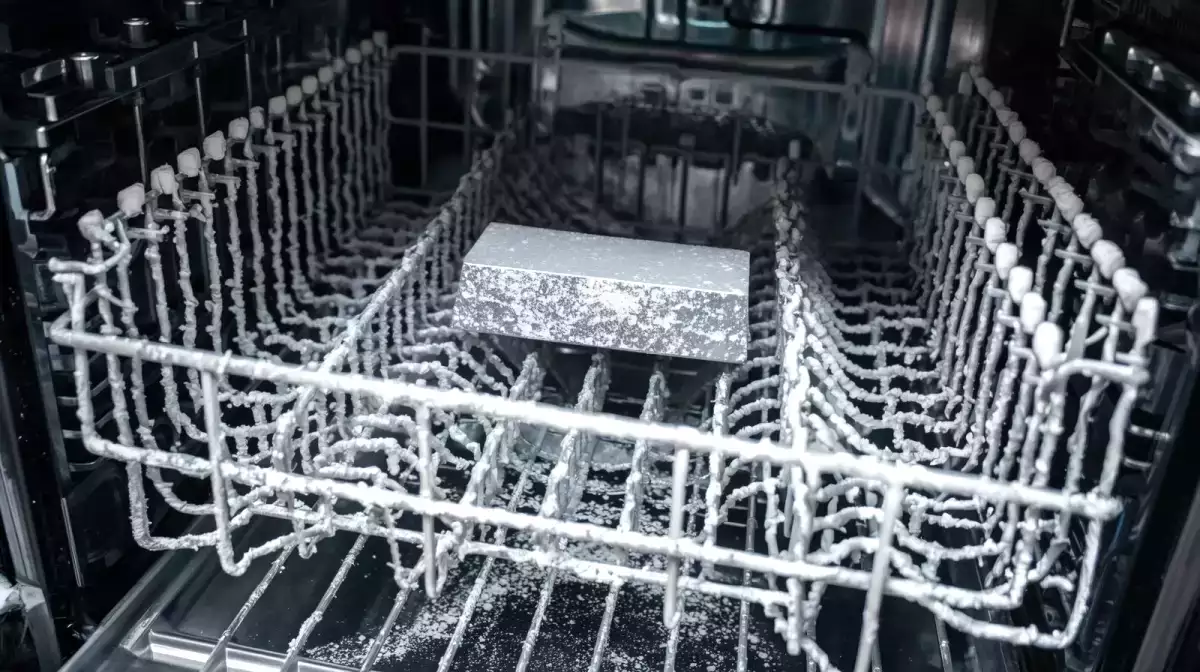Think your dishwasher is working well? Limescale could be quietly shortening its life with every wash

Tarnished glasses, white deposits on plates, a machine that makes more noise than before... If your dishwasher shows these signs, the culprit is obvious: limescale. Invisible at first, it builds up with each wash and ends up damaging both the dishes and the machine.
But there's no need for miracle products or industrial descalers: a few simple gestures and a few natural ingredients are all you need to protect your dishwasher and extend its life.
Why does limescale build up?
Tap water naturally contains calcium and magnesium, the minerals responsible for limescale. The harder your water, the faster the scale deposits.
➡️ Result:
- Heating elements scale up, making washing less efficient.
- The washing arm can become blocked.
- Glasses come out dull and covered with white marks.
In areas with very hard water, deposits can appear in just a few weeks.
The essential regenerating salt
It's the first anti-scale reflex. Regenerating salt is not used to salt your dishes, but to regenerate the dishwasher's softening resin.
✔️ This resin captures calcium and magnesium ions to soften the water before washing.
Without salt, the system saturates, and limescale deposits everywhere.
How to use:
➡️ Fill the salt tank (usually at the bottom of the machine) as soon as the indicator light comes on.
➡️ If you live in a very calcareous area, refill it regularly, about once a month.
➡️ Always use dishwasher-safe salt: coarse table salts sometimes contain additives that can damage the machine.
Tip: even with "all-in-one" tablets, it's best to keep the regenerating salt - their softening effect is often insufficient.
White vinegar, the natural tartar remover
It's grandma's magic ingredient, and for good reason: white vinegar naturally dissolves limescale thanks to its mild acidity.
✔️ It cleans, deodorizes and shines without damaging seals or pipes.
How to use:
- Pour two large glasses of white vinegar directly into the bottom of an empty dishwasher.
- Run a 140°F/60°C cycle without dishes.
- Repeat once a month.
➡️ This simple routine removes invisible deposits from wash arms and heating elements, while neutralizing unpleasant odors.
Caution: avoid putting vinegar in the rinse liquid compartment, as this may damage the pump seal in the long term.
Baking soda for deep cleaning
Another natural cleaning essential: baking soda.
It doesn't just deodorize: it reinforces the anti-scale action of vinegar and prevents deposits from forming.
How to use:
- Sprinkle two tablespoons of baking soda in the bottom of the tank.
- Add a glass of white vinegar.
- Leave to foam for a few seconds, then run an empty cycle at 140°F/60°C.
✔️ Your machine comes out clean, descaled and perfectly deodorized.
➡️ Do this every two months if you use your dishwasher frequently.
Bonus tip: lemon for shine
Lemon juice acts as a natural softener and leaves a fresh scent.
Simply add a few lemon slices to the upper basket before a full cycle (with dishes this time).
Result:
✔️ Shiny dishes
✔️ Streak-free glassware
✔️ Light anti-scale protection thanks to citric acid
Daily machine maintenance
A few good habits will prolong the life of your dishwasher:
➡️ Clean the filter once a week. Food residues can increase scaling.
➡️ Wipe door seals regularly: limescale settles easily.
➡️ Don' t overload the dishwasher: good water circulation prevents deposits.
➡️ And above all, don't let water stagnate in the bottom of the tank: it's a breeding ground for scale and odours.
In a nutshell
✔️ Limescale doesn't have to be a fatality: a few simple steps are all it takes to eliminate it.
✔️ The winning trio: regenerating salt + white vinegar + baking soda.
✔️ Regular maintenance is better than one-off clean-ups.
✔️ And for shine, a touch of lemon makes all the difference.
 Adèle Peyches
Adèle Peyches
Comments